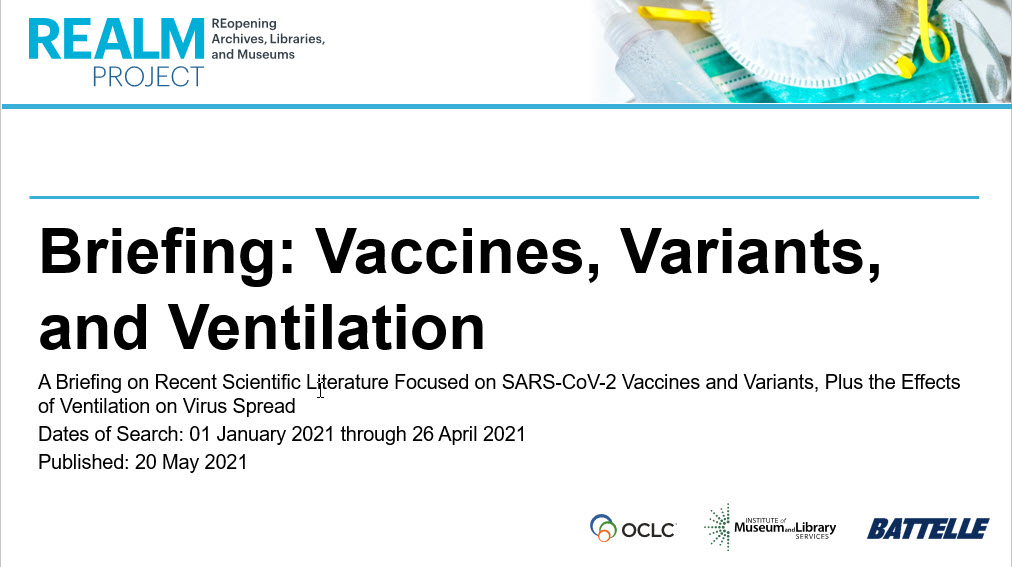REALM Project
REopening
Archives, Libraries,
and Museums
Research
Research > Briefing - Vaccines, variants and ventilation
Research briefing: Vaccines, variants, and ventilation
This briefing, prepared by researchers at Battelle, is intended to provide timely information about SARS-CoV-2 vaccines and variants to libraries, archives, and museums (LAMs), and their stakeholders. This is a review of scientific literature published through 16 August 2021, and should be used in conjunction with other timely resources to ensure decision-making in LAMs reflects the latest scientific understanding. Continual re-evaluation of SARS-CoV-2 policies is highly recommended as new scientific discoveries are published.
Research questions
- What implications does SARS-CoV-2 vaccination in the United States have for public health interventions and policies, especially related to indoor environments?
- What differences have been found for SARS-CoV-2 variants (compared to the original strain) in the United States in terms of spread, transmissibility, surface attenuation, and effectiveness of public health interventions?
- What effects do ventilation and ventilation-based interventions (e.g., heating, ventilation, and air conditioning systems (HVAC)) have on the spread of SARS-CoV-2 in indoor environments?
HIGHLIGHTS
- Ventilation: In a retrospective observational study of a workplace COVID-19 cluster in Italy, researchers found that in spaces that are poorly ventilated and have high occupancy, typical nonpharmaceutical interventions (e.g., distancing of greater than 1 meter, use of plexiglass panels, use of hand sanitizer, and wearing masks when moving about the office (but not while seated at a desk) were not sufficient in preventing an outbreak among staff.
- Variants: A report of a B.1.1.7 (Alpha) variant outbreak in a long-term care facility in Germany indicated that though breakthrough infections occurred in the majority of vaccinated individuals, they had milder symptoms and faster time to negative test results than unvaccinated individuals.
- Vaccines: Breakthrough infections among vaccinated individuals tend to have milder symptoms and shorter periods of illness. One study assessed breakthrough COVID-19 infections among fully vaccinated healthcare workers (N=1,497) and found that 39 had documented infections of SARS-CoV-2. Most were mild or asymptomatic, but some did have persistent symptoms (more than 6 weeks).
Notes for the reader
As you read this briefing, keep in mind a few key points:
- The research and information captured in the findings include both peer-reviewed and non-peer-reviewed studies. In the interest of publishing emerging research related to the COVID-19 pandemic as quickly as possible, publication has been expedited rather than waiting for time-intensive peer review.
- The review includes findings for industries, such as health care, that operate under considerably different constraints and risk factors than do libraries, archives, and museums (LAMs). However, it was important to consider a broad range of available research to determine what may be applicable to LAM operations and identify what research gaps exist. The research captured in the review does not represent recommendations or guidance for LAMs.
- Additional literature reviews and research briefings are available from REALM.
- A helpful resource for those interested in tracking the "known unknowns" about this virus is the DHS Master Question List for COVID-19 (caused by SARS-CoV-2).

